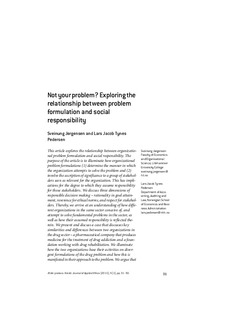| dc.contributor.author | Jørgensen, Sveinung | |
| dc.contributor.author | Pedersen, Lars Jacob Tynes | |
| dc.date.accessioned | 2019-06-14T10:18:19Z | |
| dc.date.available | 2019-06-14T10:18:19Z | |
| dc.date.created | 2011-05-10T11:34:52Z | |
| dc.date.issued | 2011 | |
| dc.identifier.citation | Etikk i praksis. 2011, 5 (1), 31-50. | nb_NO |
| dc.identifier.issn | 1890-3991 | |
| dc.identifier.uri | http://hdl.handle.net/11250/2600848 | |
| dc.description.abstract | This article explores the relationship between organizational problem formulation and social responsibility. The
purpose of the article is to illuminate how organizational
problem formulations (1) determine the manner in which
the organization attempts to solve the problem and (2)
involve the ascription of significance to a group of stakeholders seen as relevant for the organization. This has implications for the degree to which they assume responsibility
for those stakeholders. We discuss three dimensions of
responsible decision making – rationality in goal attainment, reverence for ethical norms, and respect for stakeholders. Thereby, we arrive at an understanding of how different organizations in the same sector conceive of, and
attempt to solve fundamental problems in the sector, as
well as how their assumed responsibility is reflected therein. We present and discuss a case that discusses key
similarities and differences between two organizations in
the drug sector – a pharmaceutical company that produces
medicine for the treatment of drug addiction and a foundation working with drug rehabilitation. We illuminate
how the two organizations base their activities on divergent formulations of the drug problem and how this is
manifested in their approach to the problem. We argue that this ultimately translates into differences in the inclusion of various stakeholders in their problem space, and thereby the degree to which they assume
responsibility for key stakeholders. This contributes to the corporate social
responsibility literature by providing an in depth account of how problem formulations shape organizational activities and determine the practical inclusion of stakeholders’ interests in the decisions and activities of organizations. | nb_NO |
| dc.language.iso | eng | nb_NO |
| dc.rights | Navngivelse 4.0 Internasjonal | * |
| dc.rights.uri | http://creativecommons.org/licenses/by/4.0/deed.no | * |
| dc.subject | corporate social responsibility | nb_NO |
| dc.subject | decision making | nb_NO |
| dc.subject | problem formulation | nb_NO |
| dc.subject | stakeholder management | nb_NO |
| dc.title | Not your problem? Exploring the relationship between problem formulation and social responsibility | nb_NO |
| dc.type | Journal article | nb_NO |
| dc.type | Peer reviewed | nb_NO |
| dc.description.version | publishedVersion | nb_NO |
| dc.subject.nsi | VDP::Social science: 200::Economics: 210::Business: 213 | nb_NO |
| dc.subject.nsi | VDP::Social science: 200::Political science and organizational theory: 240 | nb_NO |
| dc.source.pagenumber | 31-50 | nb_NO |
| dc.source.volume | 5 | nb_NO |
| dc.source.journal | Etikk i praksis | nb_NO |
| dc.source.issue | 1 | nb_NO |
| dc.identifier.doi | 10.5324/eip.v5i1.1732 | |
| dc.identifier.cristin | 804499 | |
| cristin.unitcode | 191,40,0,0 | |
| cristin.unitname | Institutt for regnskap, revisjon og rettsvitenskap | |
| cristin.ispublished | true | |
| cristin.fulltext | original | |
| cristin.qualitycode | 1 | |

